Issue 08. 11 June 2012 - UWA Staff - The University of Western ...
Issue 08. 11 June 2012 - UWA Staff - The University of Western ...
Issue 08. 11 June 2012 - UWA Staff - The University of Western ...
Create successful ePaper yourself
Turn your PDF publications into a flip-book with our unique Google optimized e-Paper software.
Setting our sights high<br />
Paul Johnson<br />
Vice-Chancellor<br />
In the past few millennia we have<br />
made the most astonishing and<br />
unexpected discoveries about the<br />
cosmos and our place within it,<br />
explorations that are exhilarating<br />
to consider.<br />
<strong>The</strong>y remind us that humans have<br />
evolved to wonder, that understanding<br />
is a joy, that knowledge is prerequisite<br />
to survival. I believe our future depends<br />
powerfully on how well we understand<br />
this cosmos in which we float like a<br />
mote <strong>of</strong> dust in the morning sky – Carl<br />
Sagan, astrophysicist and astronomer<br />
(1934-1996).<br />
<strong>The</strong> words <strong>of</strong> the late Carl Sagan<br />
seemed particularly relevant in recent<br />
weeks as we celebrated Australia’s<br />
success in gaining a large part <strong>of</strong> the<br />
$2 billion international radio telescope<br />
project, the Square Kilometre Array, and<br />
just a week later later watched the<br />
‘transit <strong>of</strong> Venus’ which will not be seen<br />
for another 105 years.<br />
Australia’s success in the SKA project<br />
should not be under-estimated. It has<br />
the potential to inspire a nation, excite<br />
future generations <strong>of</strong> scientists and<br />
ignite collaborations.<br />
At an international level, the SKA project<br />
– the world’s biggest radio telescope –<br />
will ensure Australia’s ability to generate<br />
new knowledge <strong>of</strong> global significance.<br />
At a State level, <strong>Western</strong> Australia will<br />
add new cutting edge science to its<br />
portfolio <strong>of</strong> globally competitive<br />
resources; and at a university level,<br />
<strong>UWA</strong> will continue to expand its<br />
reputation as a world leader in radio<br />
astronomy with <strong>UWA</strong> staff taking a<br />
leading role in the International Centre<br />
for Radio Astronomy Research – a<br />
collaboration between our <strong>University</strong><br />
and Curtin.<br />
<strong>The</strong> SKA project will be a magnet for<br />
many <strong>of</strong> the world’s top scientists and<br />
researchers in fields such as astronomy,<br />
computer science, engineering,<br />
geology, environmental management<br />
and renewable energy. Many technical<br />
and support staff will also find<br />
employment and the project will<br />
attract business and industry worldwide<br />
to WA.<br />
This is science which will extend our<br />
knowledge from the beginnings <strong>of</strong> our<br />
universe and at the same time develop<br />
technologies and processes which will<br />
be <strong>of</strong> practical benefit to industry,<br />
business and the wider community.<br />
<strong>The</strong> decision also continues Australia’s<br />
proud scientific tradition. Whatever other<br />
traits have distinguished us, we have<br />
been an innovative country rich in, and<br />
enriched by, scientific imagination.<br />
Innovation and science have advanced<br />
our health, our prosperity and our public<br />
life … they have made us better at world<br />
affairs, and a better nation as a whole.<br />
<strong>The</strong> SKA will ensure new generations <strong>of</strong><br />
bright young minds share in the<br />
excitement and potential <strong>of</strong> science in<br />
general and astronomy in particular.<br />
That enthusiasm was on show last week<br />
when students joined the WA Governor<br />
and other dignitaries to view the Transit<br />
<strong>of</strong> Venus through a solar telescope at the<br />
Gingin Gravity Discovery Centre next to<br />
the <strong>UWA</strong> Gravity Wave observatory,<br />
north <strong>of</strong> Perth.<br />
<strong>The</strong> next transit is more than a century<br />
<strong>of</strong>f. It is impossible to imagine what<br />
humankind will know <strong>of</strong> the Universe<br />
by then. But we can be sure that our<br />
<strong>University</strong>, through our affiliations in<br />
projects such as the SKA, will have<br />
played enormous roles in relaying<br />
that knowledge.<br />
A study <strong>of</strong><br />
the essential<br />
Australia<br />
How do you visualise Australia?<br />
Do you see images <strong>of</strong> kangaroos<br />
bounding through the bush, bronzed surf<br />
lifesavers patrolling the beaches or<br />
kilometres <strong>of</strong> suburban front yards<br />
dominated by Japanese cars?<br />
Anthropologist Martin Forsey is making<br />
the most <strong>of</strong> his Australian Studies class<br />
this semester, in which more than 60 <strong>of</strong><br />
the 97 participants are international<br />
students. He set them all a research<br />
project: to analyse forms <strong>of</strong><br />
representation <strong>of</strong> Australia from<br />
several perspectives.<br />
4 | <strong>UWA</strong> NEWS <strong>11</strong> <strong>June</strong> <strong>2012</strong> the <strong>University</strong> <strong>of</strong> <strong>Western</strong> Australia


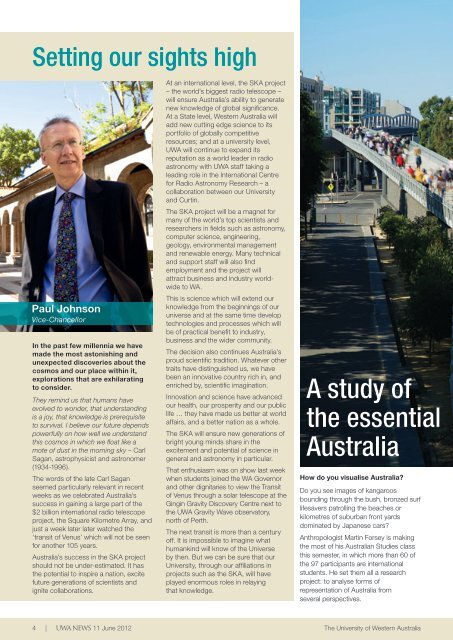
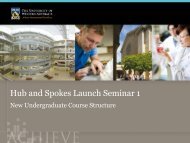
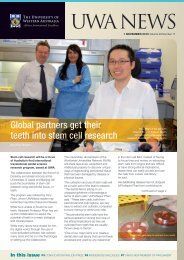
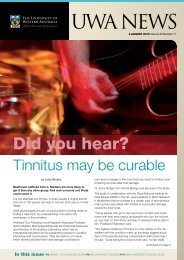
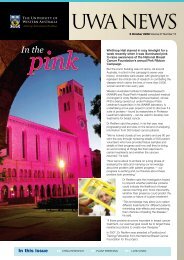
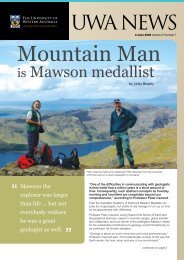
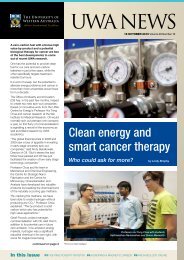
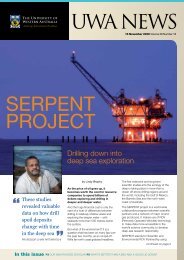


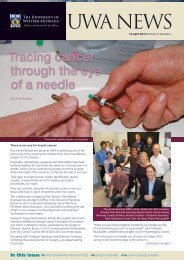
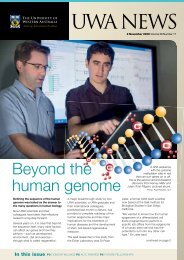
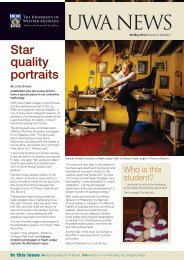
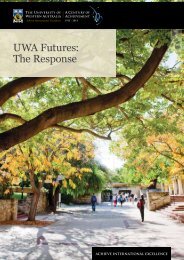
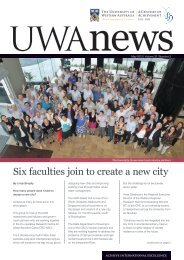
![Issue 13. 6 September 2010.pdf [PDF File, 1.7 MB] - UWA Staff - The ...](https://img.yumpu.com/26619782/1/184x260/issue-13-6-september-2010pdf-pdf-file-17-mb-uwa-staff-the-.jpg?quality=85)